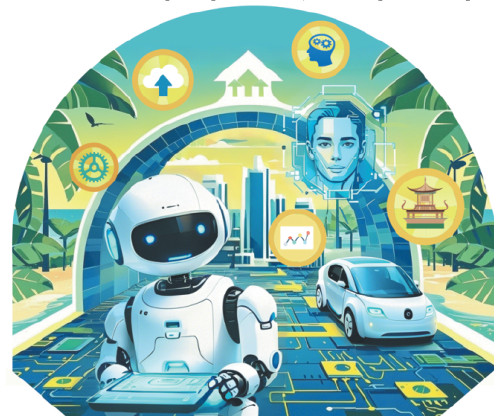Does AI pose a threat to sustainable development?
The 2025 World Economic Forum, being held in Davos from Monday to Friday under the theme "Collaboration for the Intelligent Age", is expected to foster a spirit of cooperation and optimism in the digital age in a more sustainable way, despite the different positions of the participants and global uncertainties. Three experts share their views on the issue with China Daily.
Projected estimates indicate that advanced artificial intelligence (AI) systems will necessitate over $1 trillion in investments for cloud and enterprise data center infrastructure within the next five years.
The AI infrastructure includes servers equipped with graphics processing units (GPUs) or custom accelerators, dedicated networks, storage solutions and specialized facilities, which are all factors that demand significant capital investment. Therefore, evaluating the scale, potential returns and environmental impact of AI's rapid development and application is essential.
The rise of AI will significantly impact the energy sector, as AI systems require a substantial amount of energy. According to the International Energy Agency, a large percentage of energy consumption in data centers is dedicated to computing and cooling, each accounting for about 40 percent.
This situation is expected to become even more complicated with the increasing use of AI systems, as their greater computing power leads to higher power density. Dense clusters of high-performance chips generate significantly more heat than standard central processing units (CPUs), requiring much more energy for cooling these systems to prevent overheating.
GPUs are specifically designed for AI and heavy computing tasks. They need to run continuously and thus consume significantly more power than standard processors. A typical CPU or server chip, in general, consumes between 75 watts and 200 watts, comparable to a light bulb's power consumption. In contrast, modern NVIDIA GPUs designed for AI applications can consume five to 10 times more power, resulting in a similar increase in heat generation.
As a result, the power consumption of a typical hyper-scale data center is expected to rise from its current level of 30-40 megawatts to over 300 MW within the next three to five years.
In 2022, data centers consumed 460 terawatt hours (TWh) of electricity, accounting for 2 percent of the world's total electricity consumption. However, a recent report by the IEA indicates that data centers could potentially double their energy consumption by 2026, exceeding 1,000 TWh, roughly equivalent to the entire energy consumption of Japan.
#AI #SustainableDevelopment #AIImpact #TechnologyEthics #ArtificialIntelligence #Sustainability #GreenTech #ClimateChange #AIforGood #EthicalAI #SustainableFuture #DigitalTransformation #Innovation#ResearcherLife #AcademicResearch #PhDLife #ResearchCommunity #Innovation #ScientificResearch #DataAnalysis #ResearchAndDevelopment #Scholars #LabWork #PostdocLife #PeerReview #PublishOrPerish #ResearchGoals #STEMResearch #FieldWork #CollaborativeResearch #ResearchMatters #KnowledgeSharing #FutureOfScience
International Young Scientist Awards
Website link: youngscientistawards.com
Nomination Link: https://youngscientistawards.com/award-nomination/?ecategory=Awards&rcategory=Awardee
Contact Us: support@youngscientistawards.com
_________________________________________________________________________________________________________
Social Media:
Twitter : https://twitter.com/youngsc06963908
Linkedin- : https://www.linkedin.com/in/shravya-r...
Pinterest : https://in.pinterest.com/youngscienti...
Blog : https://youngscientistaward.blogspot....
Tumblr : https://www.tumblr.com/blog/shravya9v




Comments
Post a Comment